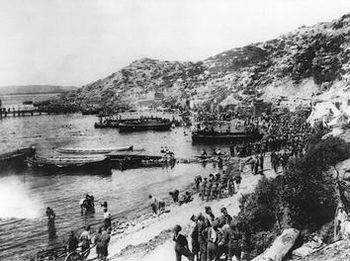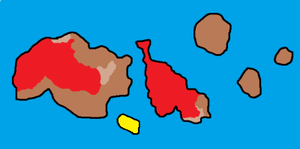Civil War in Thracistan
| Civil War in Thracistan | |||||||
|---|---|---|---|---|---|---|---|
| Part of Thraci unrest | |||||||
 Landing of Liberadosan forces on Er island |
|||||||
|
|||||||
| Belligerents | |||||||
|
|||||||
| Commanders and leaders | |||||||
| Units involved | |||||||
| Strength | |||||||
| Casualties and losses | |||||||
| 1,000+ killed | 500 - 1,000 killed President Gazi taken prisoner |
||||||
The Civil War in Thracistan is an ongoing conflict between the government of Thracistan (re-organised in the TAJCT) and the Military Government of Thracistan that overthrow President Alperen Mithat Gazi's democratically elected government in 1673.
Background
1673 coup d'etat
1673 Thraci Coup d'etat was a military event in the ancient capital of Thracistan.The order did not occur in the chain of command, but by the planning of 45 officers.First, the road to parliament was cut by the soldiers, after which the assembly was bombed.The state channel was raided by several soldiers and the statement was read.The last palace where Alperen Mithat Gazi stayed was raided and the president was taken prisoner. In the morning, coup leader Ahmar Ceamçı declared himself a new leader.
Treaty of the Norfolk Isles
The Treaty of the Norfolk Isles between Los Liberados and Thracistan, signed in 1670, was an important factor in the escalation of the conflict into a multi-national war. The treaty stipulated not only a mutual friendship and lasting peace between the two nations, but also laid the foundation for a mutual defensive network for the Norfolk Islands, which both nations share. The 100-mile Nautical Protection Zone, mainly guarded by the Liberadosan Milicia de Hierro required intensive cooperation between the two nations. Fearing that with the overthrow of President Gazi's government, the party that had signed the treaty, this arrangement could no longer be relied upon, the Liberadosan government decided to intervene.
Unfolding of Events
Initial Conflict
Thraci Civil War took place just after the military coup. After the royal palace was besieged, President Alperen Kadim Gazi left the nation within forty-eight hours. AEEU supporters occupied the Oynak island which became the central command centre of the army. A few days later, the landing was made to the Er island.

Establishment of the Laman Republic
The Laman Republic declared its one-way independence from Thracistan, but it did not appear on the MCS map. Thracistan did not recognize the nation, which formed the western front for the junta. Amanur and Uçqurk marched against the junta, leading to significant casualties on the government side. The Laman Army tried to move along the coastlines. As a precaution, the junta bombarded the tunnel and destroyed the bridges, so the Laman Army was not able to advance. Kadim and his AEEU supporters were bombed and marches against some junta. The Laman Army blew up an official state canal building. The VoyCom Arena suffered great damage. A helicopter landed at the Milliy Arena.
Liberadosan military intervention
In the morning of IX.5.1674, President Castrigo gave orders for the Mandato Augusto to mobilise immediately, under the command of Comendador Gabriel Valenciano, an initial landing force was assembled. The Iron Company assisted the Liberadosans in providing two warships. The initial phase of what was dubbed Operación Alborada Rossa took place only a few hours later, when the first troops crossed the Estrecho del Medio, and landed on the island of Er, which was mainly occupied by Junta forces. After a short, but intense battle, the Liberadosan military occupied the island, although a small centre of resistance remained in the North. By nightfall, the Augusto Command had given orders for an airstrike to the last posts of the Junta-loyalists, and 12 Buzzard C-61 fighter jets flew in from Racám Airbase to attack the post. In the morning of X.5.1674, the island was considered freed of Junta forces, and the Liberadosan army prepared to support the TAJCT forces on the island of Oynak.
Bombing Campaign and TAJCT victories
From its outpost on Er island, renamed to Zona Especiál Mediobueno, the Liberadosan airforce started out intense bombing campaigns on Junta targets on the two largest islands of Thracistan. In the wake of the bombings, the TAJCT forces moved to fight the remaining Junta troops on Oynak, and made fast military progress. By II.1.1675, the island of Oynak was practically liberated from Junta forces.
